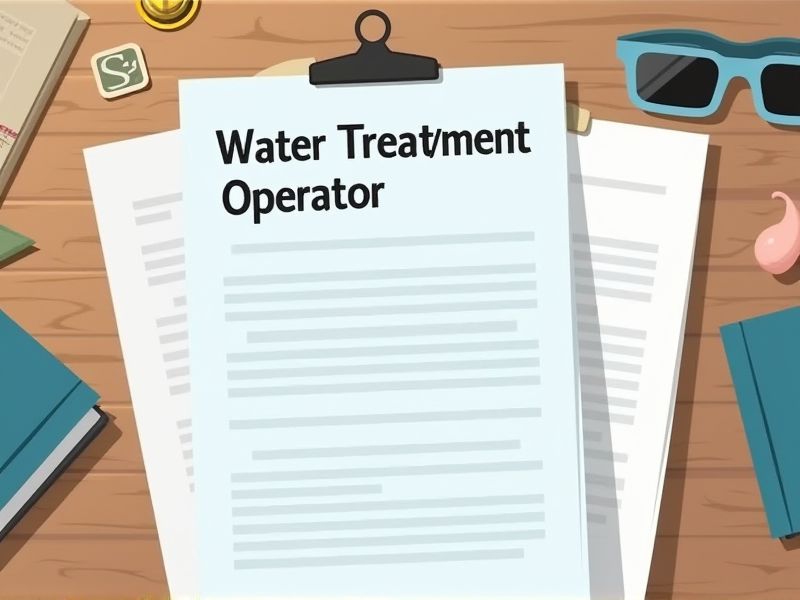
Water treatment operators play a critical role in ensuring safe and clean water for communities, necessitating a thorough understanding of complex systems and processes. Certifications provide validation of an operator's knowledge, skills, and adherence to safety standards, which are essential in preventing any potential health hazards. Regulatory bodies often require these certifications to ensure that operators can competently handle emergencies, maintain equipment, and manage chemical handling. Here are some vital certifications that you may require as a water treatment operator.
Drinking Water Treatment Operator Certification
The Drinking Water Treatment Operator Certification ensures that operators possess the necessary knowledge and skills to manage and maintain water treatment processes effectively. Safe drinking water relies on operators who are qualified to handle potential contaminants, and certification acts as a validation of their expertise. Legal compliance with regulatory standards requires that water facilities employ certified professionals to ensure that public health is not compromised. Continuous advancements in water treatment technologies necessitate ongoing education, and certification encourages operators to stay updated on industry best practices.
Wastewater Treatment Operator Certification
Wastewater Treatment Operator Certification ensures that operators have the necessary knowledge and skills to manage complex treatment processes effectively. Certified operators are better equipped to maintain compliance with regulatory standards, minimizing environmental risks. Certification provides a standardized measure of an operator's competence, which can enhance public trust in water treatment services. Proper certification can lead to improved system efficiency, reducing operational costs and potential public health issues.
Class A Water Treatment Plant Operator License
A Class A Water Treatment Plant Operator License is required because it certifies the operator's comprehensive knowledge and technical skills necessary to manage and oversee complex water treatment processes. The license ensures operators can effectively maintain compliance with strict environmental and health regulations to safeguard public health. It also indicates proficiency in handling advanced equipment and technologies essential for large-scale water treatment operations. By holding this license, operators demonstrate their expertise in addressing and resolving critical issues that may arise in a water treatment facility.
Class B Water Treatment Plant Operator License
A Class B Water Treatment Plant Operator License is necessary because it ensures the operator has the requisite knowledge to manage complex water treatment processes safely. The license validates that the operator can handle specific treatment technologies and adhere to regulatory standards, crucial for public health. It also serves as a benchmark for professional competency in managing larger treatment facilities efficiently. Without such a license, the operator may lack the proven expertise needed to ensure the water supply meets both quality and safety requirements.
Safe Drinking Water Act (SDWA) Compliance Training
Non-compliance with the Safe Drinking Water Act (SDWA) can lead to significant public health risks, including exposure to harmful contaminants, hence training ensures operators understand regulatory requirements. Water treatment operators equipped with SDWA compliance knowledge can effectively monitor and manage water quality, reducing the risk of waterborne diseases. Proper training in SDWA also minimizes legal and financial risks for water utilities by ensuring they meet federal standards. Regular training updates for operators optimize operational efficiency and technological adaptation in water treatment processes.
Hazardous Materials (HAZMAT) Certification
HAZMAT Certification for water treatment operators ensures they understand the safe handling of chemicals used in the purification process. Knowledge of hazardous materials mitigates risks of chemical accidents, protecting both the operator and the environment. This certification aids compliance with regulations that govern water quality and safety standards. Professionals with HAZMAT certification contribute to maintaining public health by preventing contamination or improper disposal of hazardous substances.
SCADA Systems Operator Certification
SCADA Systems Operator Certification equips water treatment operators with the skills to manage complex automated systems, resulting in more efficient plant operations. Certification ensures operators understand how to monitor and control the distribution of water, which helps maintain regulatory compliance. By having certified SCADA operators, water treatment facilities can reduce error rates and enhance overall public safety. Certified operators are better prepared to troubleshoot system failures, minimizing downtime and associated costs.
OSHA Safety Certification
Water treatment facilities involve handling hazardous chemicals and complex machinery, which increases the potential for accidents. OSHA safety certification is necessary to ensure operators understand and implement safety practices effectively, which reduces workplace injuries. Certified training promotes awareness of regulatory compliance, helping facilities avoid legal penalties and costly damages. Operators equipped with safety knowledge contribute to a safer working environment and improved overall operational efficiency.
Confined Space Entry Certification
Confined Space Entry Certification is required for water treatment operators because water treatment facilities often contain tanks and vessels considered confined spaces, posing significant safety risks. Unsafe conditions such as toxic gas accumulation, low oxygen levels, and limited exit routes in these areas necessitate specialized safety training. Legislation and workplace safety regulations mandate that individuals working in confined spaces must have certification to ensure they can safely and effectively handle emergencies. Certification equips operators with the critical skills and knowledge to manage potential hazards and ensures compliance with occupational safety standards.
First Aid and CPR Certification
Water Treatment Operators frequently work in environments with water bodies, where there's a risk of accidental drownings or water-related injuries, making first aid and CPR skills essential to address emergencies swiftly. The presence of hazardous chemicals in treatment facilities can lead to exposure incidents, making it necessary for operators to provide immediate care. Being certified in first aid and CPR ensures operators are prepared to stabilize colleagues or themselves in case of electric shocks from equipment malfunctions. Proper training also reduces liability for facilities by equipping staff to handle medical situations effectively until professional medical help arrives.
Summary
When you obtain certifications as a Water Treatment Operator, your expertise and credibility in the field significantly enhance. This leads to greater job opportunities and the potential for higher salaries due to recognized skill validation. Employers tend to trust certified operators more, resulting in increased responsibilities and career advancement. Certification also ensures compliance with industry standards, improving operational efficiency and public safety.
